English Words in Action, Group P
(a variety of English words which have developed through history and are currently used in our modern age)
Simply click on this banner (or the following link) and you will be on your way to stimulate your brain for greater word comprehension with quizzes based on some of the words in this unit.
2. Inconsistent or not of the same quality throughout; having some parts that are good and some that are bad: Pete's patchy skills in writing didn't help him get accepted by the university when he applied for admittance.
Bettie had a patchier understanding about her brother's illness than her mother.
The new carpenter seemed to have the patchiest skills of any of the other construction workers.
2. Etymology: from Latin: patrimonium; from pater, "father".
2. A reference to someone who is irritable, grouchy, or cranky: Michael's mother gets peevish when she is kept waiting for him to get dressed for school so he can catch the bus on time.
3. Etymology: from Latin perversus, "turned the wrong way, distorted, perverse" from pervertere, "to turn around".
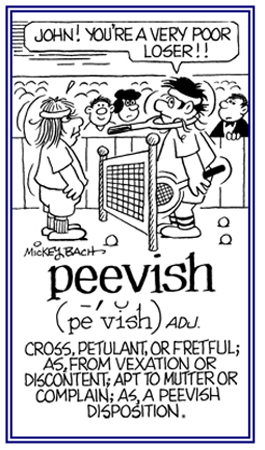
Go to this Word A Day Revisited Index
so you can see more of Mickey Bach's cartoons.
Tim's supervisor was in pent-up anger and frustration when he saw the loss of profits for his company that happened during the past month.
2. Relating to feelings being confined or repressed: When Jill fell down and hurt her knee, she had pent-up emotions and did not cry at first.3. Etymology: from Latin penna, "feather" and from Old French penne, "feather".
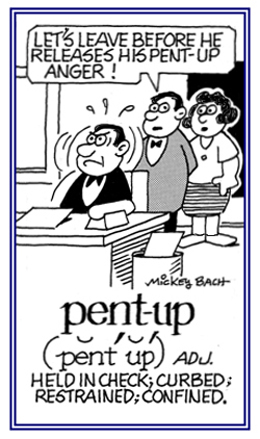
Go to this Word A Day Revisited Index
so you can see more of Mickey Bach's cartoons.
2. Etymology: relating to Pericles or to the Periclean Age when Athens was intellectually, artistically, and materially preeminent.
The Periclean era is described as the golden age of Athens.
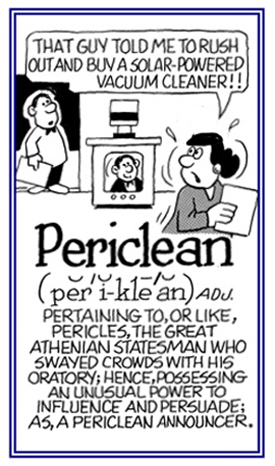
Go to this Word A Day Revisited Index
so you can see more of Mickey Bach's cartoons.
These particular perovskites are known as LAO (lanthanum aluminum oxide) and STO (strontium titanium oxide), and both of them are insulators; however, when they are sandwiched together, the resulting "heterostructure" (the interface that occurs between two layers or regions of dissimilar crystalline semiconductors) can conduct electricity at the surfaces where the materials meet.
When the two perovskites are cooled to near-absolute zero, the heterostructure becomes a superconductor, conducting electricity without any resistance.
Named for Russian mineralogist L. A. Perovski (1792-1856) in 1839.
2. Relating to a person who places too much emphasis on trivial or minor things: Patricia has a very persnickety or fussy attitude about the way her meals are prepared.
3. Etymology: from American English, 1905; "overly fastidious, fussy".
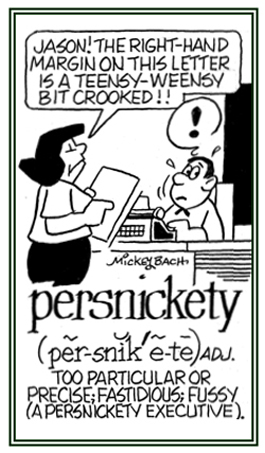
Go to this Word A Day Revisited Index
so you can see more of Mickey Bach's cartoons.
2. A remarkable, talented, and unusual individual or event: Beethoven was considered to be a phenomenon among musicians.
The normal plural form of phenomenon is supposed to be phenomena; however, phenomenons is also usually acceptable when referring to people or things: Reckless speculators are phenomenons among today's investors.
Phenomena is the correct plural form for scientific content: The phenomena were observed by astronomers throughout the world.
Tomorrow's weather forecast calls for several atmospheric phenomena.
A philippic is a fiery, damning speech, denunciation, or outburst, delivered to condemn a particular person or people.
2. Etymology: from Latin philippicus and Greek philippkos from speeches relating to Philip made by Demosthenes against Philip II of Macedon.
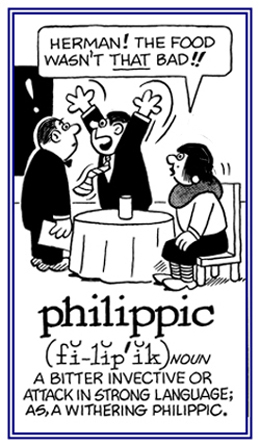
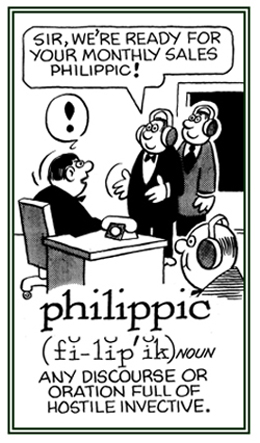
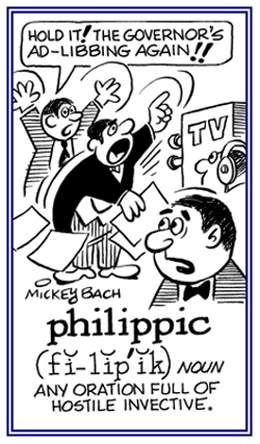
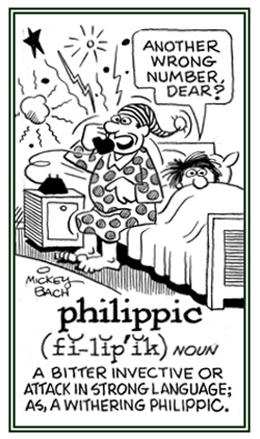
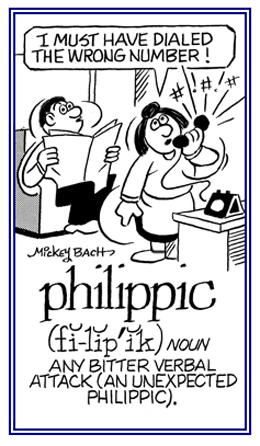
Go to this Word A Day Revisited Index
so you can see more of Mickey Bach's cartoons.
2. Etymology: from French, picaillon, "small coin, halfpenny".
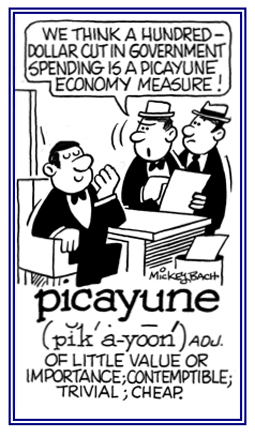
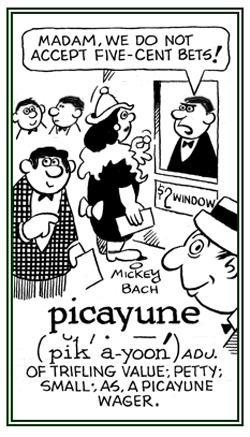
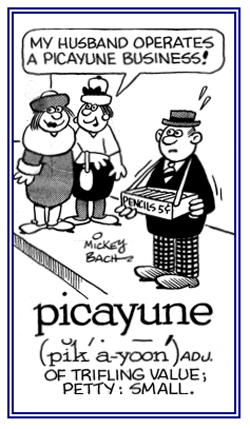
Go to this Word A Day Revisited Index
so you can see more of Mickey Bach's cartoons.
2. An insignificant person or thing: In this part of Germany, people have been experiencing winter that is so mild that it is a picayune because it is more like spring than winter.
2. A reference to a person who is exceedingly careful about choosing or accepting things: Sarina is a very picky eater because she doesn't want to get fat by consuming foods that would cause her to put on weight.
3. Etymology: from earlier pike, "to pick"; influenced by French piquer, "to pierce".
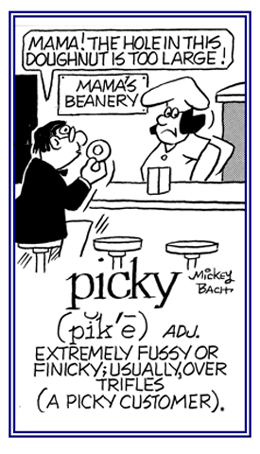
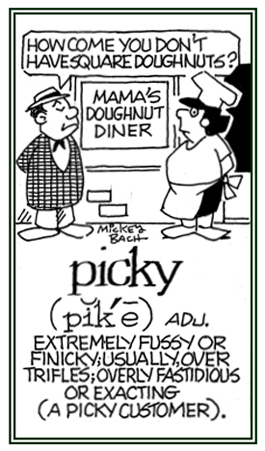
Go to this Word A Day Revisited Index
so you can see more of Mickey Bach's cartoons.
Big-time thieves aren’t interested in small amounts of money; so, they don’t pilfer because they are not petty thieves.
There was a magazine article titled "Pilfering Priests" about some clergy of the Catholic Church who were stealing money from their parishes; and in one parish, it was found that $8.6 million dollars was misappropriated over a period of 42 years. Is it appropriate for the title to be published as "Pilfering Priests" when such large sums of money were being stolen?
There was one survey in which 85% of the dioceses reported embezzlement cases; 11% of which had grand thefts of $500,000 or more. We need to remember that grand theft is not synonymous with pilfering.
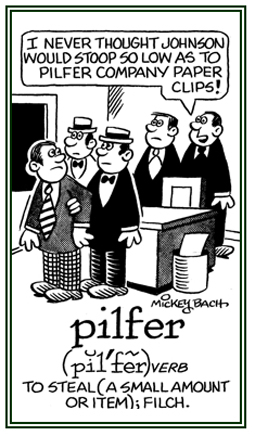
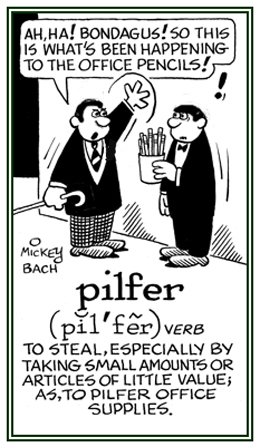
Go to this Word A Day Revisited Index
so you can see more of Mickey Bach's cartoons.
Links to all of the groups of English words in action, Groups A to Z.
You may see the bibliographic list of sources of information for these words in action.


